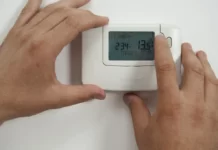A water heater is an essential appliance in homes. When you have one, you can get hot water whenever you need it, allowing you to shower and wash clothes and dishes at a suitable temperature. A water heater consumes less energy and less water. As a result, your electricity and water bills will eventually decrease, helping you save money in the long run.
You can enjoy all the perks of having a water heater at home when you know how to properly care for it. And contrary to popular belief, this task is actually easy. Even homeowners who don’t have the technical background on how water heaters work can easily care for the appliance.
How to Maintain a Water Heater – Tips you Should Know
Here are seven water heater maintenance tips every homeowner should know:
1. Inspect Regularly
Taking care of your water heater doesn’t always require expensive tools— visually inspecting the unit consistently is sometimes enough. Inspecting your water heater regularly is a must if you want to maintain its condition. This allows you to examine if the appliance shows any signs of wear and tear and other forms of damages.
If you notice that something is wrong with your water heater, opt to call professionals right away. Climate Control Heating, Cooling & Plumbing and other reliable water heater contractors from your area can inspect your water heater and repair problems immediately. Working with professionals as soon as possible can help you catch problems early and prevent them from turning into major issues.
2. Drain Annually
Over time, sediments can build up inside your water heater, which can cause clogs. These sediments can shorten the lifespan of the unit and adversely affect the cleanliness of the water it produces.
To ensure that your water remains usable, drain the unit once a year. This is a simple yet effective hack to clean the interior of the tank and remove any sediment that might have built up in your water heater. Doing this regularly will prolong the lifespan of your water heater and ensure that it continues to produce clean, potable water for the family.
Before draining your water heater, shut off the power and let the unit cool first. Then, attach a hose to the unit to easily drain the remainder of the tank.
3. Adjust The Thermostat Whenever The Family Leaves Town
If your family often takes out-of-town vacations for a couple of days, make certain adjustments to your water heater before leaving. You don’t want to arrive home to a damaged water heater, right?
Always adjust your water heater’s thermostat to ‘vacation’ settings whenever you and your family leave town. This setting conserves the energy of the unit by running at a lower temperature. This ensures that your water heater doesn’t produce hot water when no one is at home.

4. Check The Pressure Valve
The pressure valve plays a crucial role in the functionality of your gas-powered or electric water heater. This works by releasing water and lowering the pressure inside the tank once the water heater is used. The pressure valve is also responsible for maintaining normal levels of pressure inside the tank in the event when the pressure or temperature gets too high.
To check the pressure valve, start by turning off the power to the water heater. Next, grab a bucket of water and position it underneath the valve and gently pull the lever. As you’re pulling the lever, you should be able to see some water vapor and hear a rush of air. If you notice that the water continues to flow from the valve, unscrew the old valve, and replace it with a brand new one.
5. Pay Attention To The Temperature
Yes, the main function of your water heater is to produce hot water, but this doesn’t mean that you should go overboard with the settings. In general, you should never max out your water heater settings, as this can significantly damage the unit.
If you want to enjoy your water heater for years, set the temperature only at 120 degrees or lower. Setting a temperature higher than 120 degrees can burn some of the water heater’s essential parts. Plus, frequently setting the temperature higher than 120 degrees can cause your energy bills to increase.
6. Install Insulation
Your water heater will not serve its purpose if heat is escaping all the time. Instead of enjoying hot water for your shower or bath, your water heater will only cause your bills to skyrocket.
To ensure the efficiency of your water heater, install insulation. This is a must to prevent heat from escaping the unit, allowing the water heater to produce hot water fast. Over time, this can help lower your energy bills.
Always prioritize installing insulation during winter. This will protect the pipes from the extreme cold and prevent them from freezing due to the weather. When your water heater is properly insulated, you can avoid paying for expensive repairs and replacements from bursting pipes in your home.
7. Clear Away Flammable Materials
The basement is often used as storage for various cleaning products, gasoline, paint, and other combustibles. There’s nothing wrong with using your basement as storage, but if you have a water heater installed inside, you need to be more careful.
Our last maintenance tip to follow to take care of your water heater is to avoid storing any flammable materials near the unit. When stored near a water heater, flammable materials and liquids can cause fires. House fires are a major problem that can negatively impact your life.
Final Words
A water heater is an important investment, so make sure that you exert time and effort in maintaining it. Ideally, the water heater maintenance tips presented in this article should be incorporated into your lifestyle, so looking after your water heater becomes more of a habit.
You’ll also have better chances of preserving the condition of your water heater if you pair your efforts with professional help. Water heater contractors have the proper tools and experience to assess the overall condition of your unit and make repairs as soon as possible.














